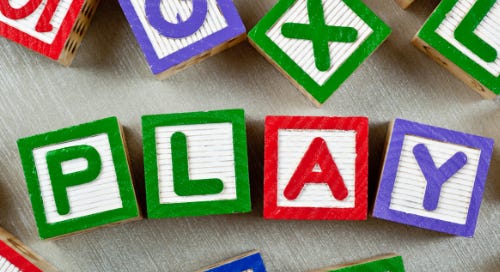Today lets discuss the fascinating subject of the neuroscience of play:
We Are All Born to Learn Through Play:
From our earliest days, play is how we relate to the world and each other. Children come into the world ready to experiment and learn through play.
As we play, we not only adapt the structure of our brains but also strengthen the skills we need to continue being engaged, flexible learners throughout our lives.
Research shows that people learn best from experiences that are:
Joyful: Positive emotions enhance learning.
Meaningfully Connected: Relating play to real-life situations.
Actively Engaging: Hands-on exploration and experimentation.
Iteratively Tested: Learning through trial and error.
Socially Interactive: Collaborating with others.
Each strand of play helps us weave a strong and flexible tapestry of skills to use throughout iur lives.
Play Unlocks Essential Skills:
Our world never stops changing, so how do we prepare children to navigate it? We let them play.
Play is part of the neurobiology of all mammals. It’s one of seven primary emotional systems pre-wired in the human brain.
The play circuits in the midbrain are crucial to wiring the cortex (the upper brain) in the first years of life.
Whether it’s building with blocks, pretending, or exploring nature, play shapes neural connections, creativity, problem-solving, and emotional regulation.
Play Fighting and Rule Construction:
Play fighting is especially interesting because juveniles must construct and obey certain rules.
In all species that exhibit juvenile play, it serves as a developmental tool that promotes the neocortical executive control regions to regulate other neural systems.
So when children engage in playful activities, they’re not just having fun—they’re actively shaping their brains and acquiring essential life skills.
Today, I would like you to have fun and games. They can be anything that you like but need to be something you enjoy doing.
If you are feeling like you could do something a little outside of the box (it is boxing day after all) then how about developing your own version of a sports day?
Classic Sport Day Games:
100m Sprint:
A classic sprint race where participants compete to cover 100m (or a shorter distance) as quickly as possible.
Water Balloon Toss:
Pair up participants and have them toss water balloons back and forth. The team that successfully catches the balloon without breaking it wins.
Wheelbarrow Race:
One player holds another player’s legs while they walk on their hands. The goal is to race to the finish line.
Three-Legged Race:
Tie the legs of two participants together, and they must work together to run or hop to the finish line.
Sack Race:
Participants hop inside large sacks toward the finish line. The first one to cross wins.
Obstacle Course:
Set up a series of challenges like crawling under ropes, jumping over hurdles, and zigzagging through cones.
Egg-and-Spoon Race:
Participants balance an egg on a spoon and race to the finish line without dropping it.
Backward Race:
Run backward from start to finish. It’s harder than it sounds!
Tug-of-War:
Divide into two teams and compete in a classic test of strength.
Creative and Fun Field Day Games:
Keep It Up:
Teams join hands in a circle and keep a balloon in the air without letting go. The last team standing wins.
Hand and Foot Hopscotch:
Trace outlines on the ground or tape papers representing right and left hands and feet. Players race along, placing the correct hand or foot on every square to advance.
Pass the Hoop:
Players form a long line and pass a Hula-Hoop along without breaking the chain.
Human Ring Toss:
One player tosses rings at another player. The “target” can move their body but not their feet.
The key to a successful sport day is a mix of classic favorites and fresh, exciting games. Adapt these ideas to suit your event, and let the fun begin! 🌟🏃♂️
If a sports day is not your thing how about classic board or card games?
Include a twist in that all winners have to make a ‘victory speech’ that celebrates all factors that enabled them to win the game. This is good for the brain and also is extremely fun to do!
If you are by yourself then this is still an opportunity to play.
What is your favourite solo activity?
It could be drawing, painting, crosswords, creating something, dancing, singing, anything really. Just make sure you find it fun!
Play is the only way the highest intelligence of humankind can unfold
Remember, play isn’t just a pastime; it’s a profound process that shapes our minds and prepares us for the complexities of life. Let the games begin! 🌟🧠🎮






